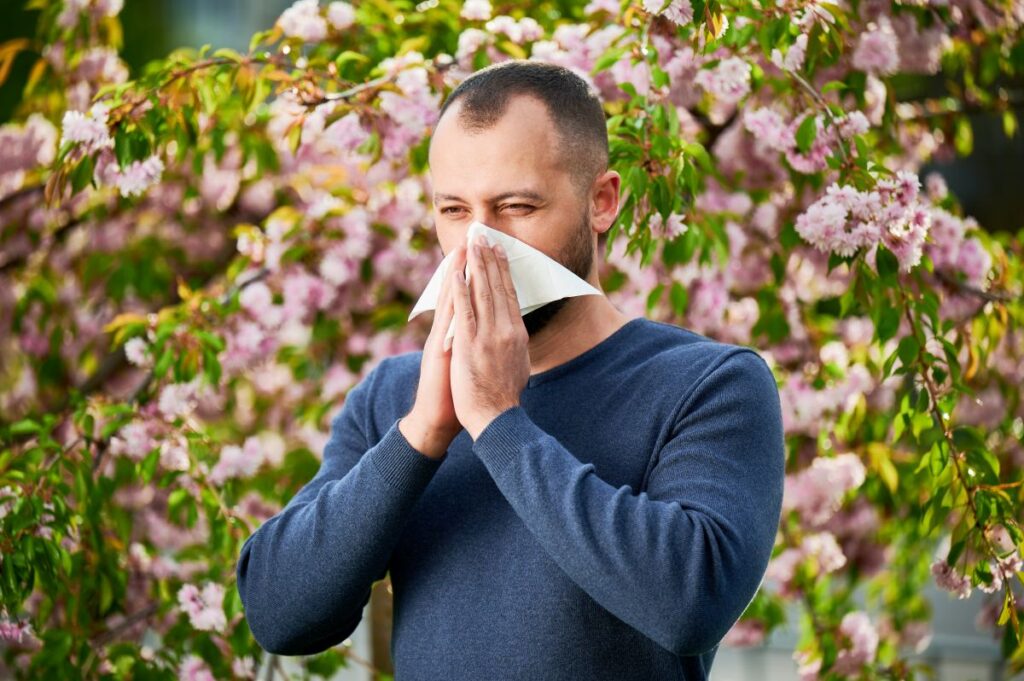Understanding Allergies in the UK: Causes, Symptoms, and Treatments
Allergies affect more than 1 in 4 people in the UK at some point in their lives, making them one of the most common chronic conditions across the populationabout Allergies. They can start in childhood and either fade or persist into adulthood—and in many cases, adults can even develop allergies later in life. Though usually mild, allergies can be life-altering and, in rare cases, life-threatening.
What Are Allergies?
An allergy is the immune system’s overreaction to substances that are typically harmless, called allergens. Common allergens in the UK include:
- Pollen (grass and tree)
- Dust mites
- Animal dander
- Food (nuts, eggs, shellfish, milk)
- Insect stings
- Medications
- Latex
- Mould
- Household chemicals

Symptoms of Allergies
Allergic reactions usually occur within minutes of exposure to an allergen. Symptoms may include:
- Sneezing and a runny or blocked nose
- Red, itchy, or watery eyes
- Wheezing or coughing
- A red, itchy rash
- Worsening asthma or eczema
- In severe cases, anaphylaxis—a potentially fatal reaction that requires immediate emergency attentionabout Allergies.
Diagnosis and When to Seek Help
If you suspect an allergy, consult a pharmacist or GP. Pharmacies in the UK, such as those participating in the Pharmacy First scheme, can offer guidance and non-prescription allergy medicine tablets. Severe or unclear allergies may require referral to a specialist for tests like:
- Skin prick tests
- Blood tests (IgE antibody levels)
- Elimination diets or oral food challenges for suspected food allergiesabout Allergies.
Treatment Options
Over-the-Counter Medications
My Pharmacy and similar UK pharmacies offer a wide range of OTC allergy treatments:
- Antihistamines: Such as cetirizine, loratadine, and fexofenadine to block histamine and relieve symptoms like itching, sneezing, and runny nosenon prescription medici….
- Nasal Sprays: Including steroid sprays like mometasone and fluticasone for inflammation reliefallergy-and-flu allergy….
- Eye Drops: For itchy or watery eyes, with ingredients like sodium cromoglicatenon prescription medici….
- Creams & Lotions: Such as hydrocortisone and calamine for skin reactionsnon prescription medici….
- Liquid Medicines: Great for children or those who prefer syrup forms of antihistaminesnon prescription medici….
Prescription Treatments
For chronic or severe allergies, doctors may prescribe:
- Stronger antihistamines
- Immunotherapy (desensitisation through controlled allergen exposure)
- Steroids in tablet or inhaler form for respiratory symptomsabout Allergies.
Prevention Tips
Although some allergies are difficult to avoid, these practical tips can help:
- Use allergen-proof bedding and keep humidity low to deter dust mites.
- Keep pets out of bedrooms and groom them regularly.
- Check food labels carefully and notify restaurants about any allergies.
- Keep windows closed during high pollen days, and shower after being outside.
- Use HEPA filters and clean surfaces with a damp cloth to reduce indoor allergens.
- Carry adrenaline auto-injectors if you’re at risk of anaphylaxisabout Allergies.
With allergies on the rise in the UK, understanding how to identify, treat, and prevent reactions is more important than ever. Whether it’s hay fever in spring or a food allergy year-round, tailored treatment and lifestyle strategies can help manage symptoms effectively.
For trusted allergy medications and advice, UK residents can explore options through services like My Pharmacy.












